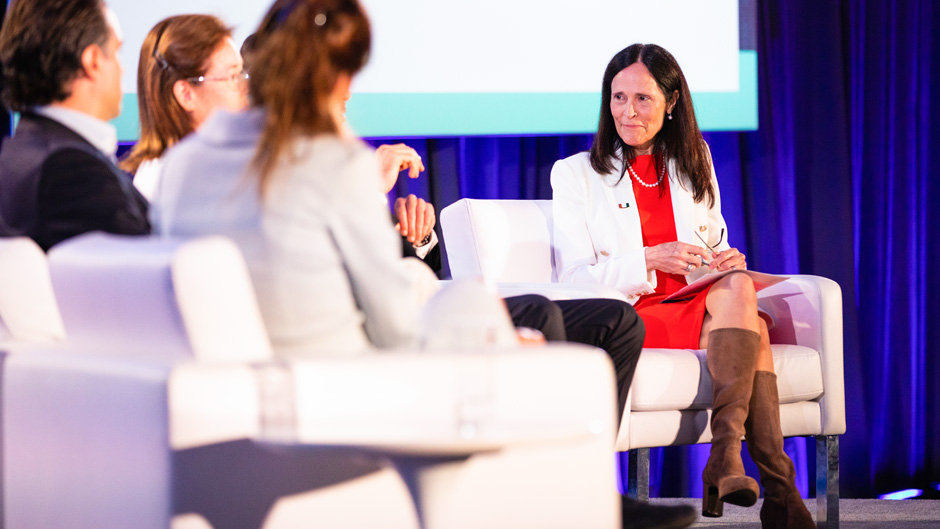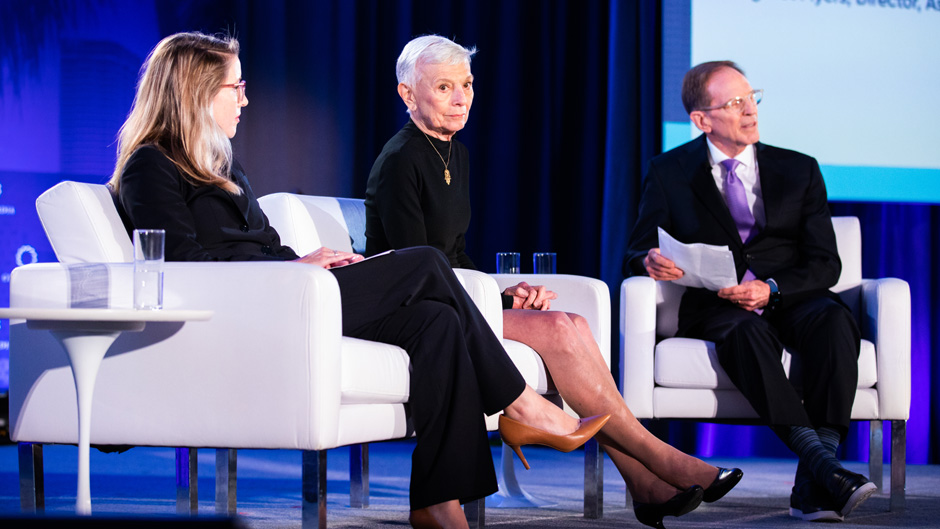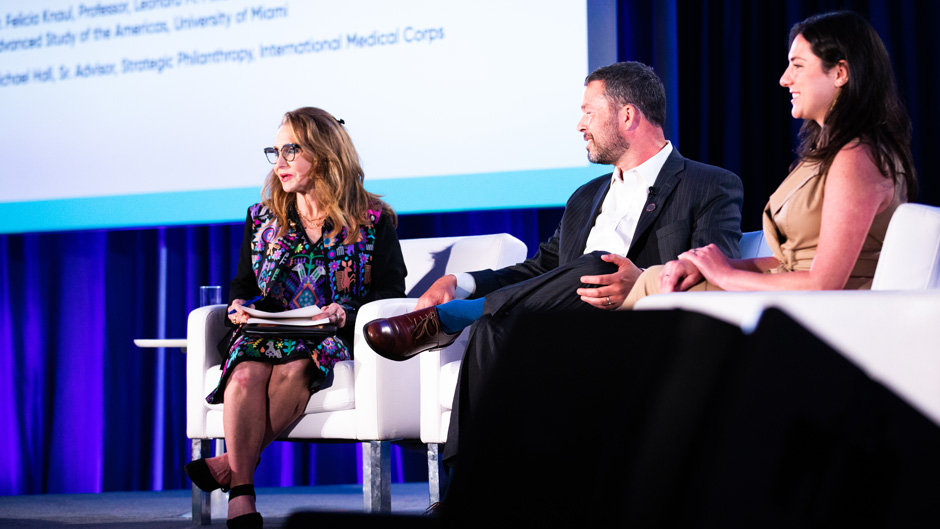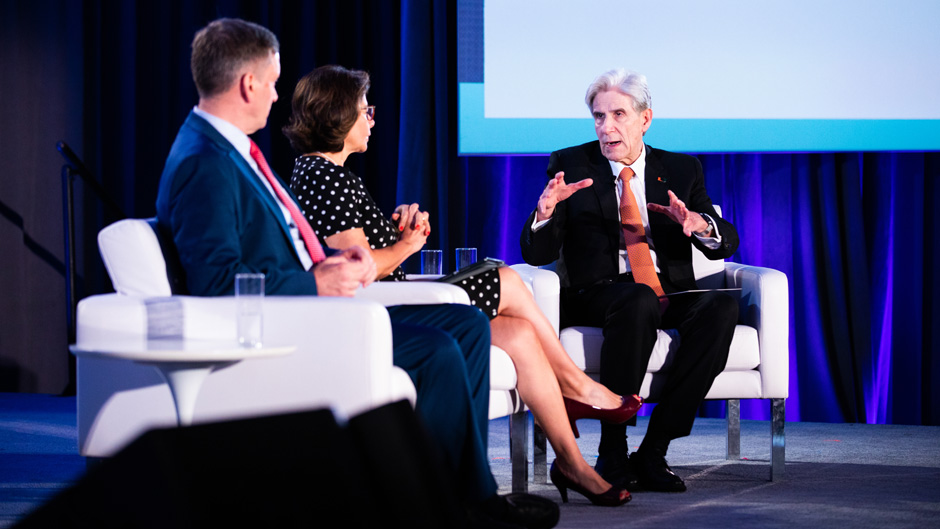The Concordia Americas Summit—a two-day international forum that convenes cross-sector decision-makers, changemakers, and influencers with the aim to forge partnerships to address critical issues facing the Western Hemisphere—opened on Wednesday at the University of Miami Shalala Student Center and continues Thursday with another full day of panels.
President Julio Frenk welcomed attendees together with Eduardo Padron, president emeritus of Miami Dade College, and Matthew Swift, CEO and co-founder of Concordia.
“As technology makes the world smaller, collaboration becomes all the more vital,” said Frenk, who described the forum as a “a meeting point for people, ideas, geographies, and cultures.”
Frenk highlighted that the current and former heads of state, business leaders, public servants, researchers, and activists attending the annual forum were rooted in a common bond and desire “to see this hemisphere reach its full potential.”
Swift expressed his appreciation to the University for returning the gathering to Miami for the first time since 2016, when it launched as a regionally focused event.
“There’s been a flexibility and a pragmatism to our partnership with the University that’s amazing and frankly needed more. It’s very impressive and incredibly important for Latin America,” said Swift. He emphasized the forum’s model that provides a space for public and private sector leaders and decision-makers “to organically convene.”
A mid-morning panel moderated by Norma Kenyon, vice president for innovation and chief innovation officer at the Miller School of Medicine, explored how public and private partnerships—such as one building solar panels in the Sierra Nevada de Santa Marta, an isolated mountain range in northern Colombia, and another using garbage trucks to track and compile data on crime and transportation—are advancing environmental sustainability and clean energy projects while preserving respect for native cultures.

In the session “China’s Growing Influence in South America,” political science professor and China specialist June Teufel Dreyer examined how China’s Belt and Road Initiative has produced a mixed bag of results. Dreyer pointed out that China has used investments in development projects to expand surveillance and intelligence gathering such as in Venezuela with the “carnet de la patria” (an identification document that includes a personalized QR code), and she noted that Japan and Taiwan are also much more active in the region today.

Felicia Knaul, director of the University’s Institute for Advanced Study of the Americas and Hemispheric and Global Affairs, facilitated a session on “Health Opportunities and Challenges Across the Western Hemisphere.”
Knaul, a health economist and expert on health systems in Latin America, emphasized that the COVID-19 pandemic has unveiled tremendous health inequities in the region and that women have shouldered the greatest burden of providing care to their families. She cited the need for the region to engage in intersectorial partnerships where health care organizations should work through community based anti-poverty programs to provide more effective delivery of services to the poor.
In addition, she recognized that opportunities have surfaced from the pandemic, such as telehealth, and called for these developments to be expanded.
Knaul noted that the vast majority of those providing health care in the region, both paid and unpaid, were women and that the persistence of this “underpaid, unrecognized, and exploited” labor force is a major contributor to the region’s poverty.
“There is a tremendous need to recognize the labor these women provide and train them for paid work on how to care for patients, especially for the growing aging population in Latin America,” Knaul said.

Frenk facilitated an afternoon session focused on learning from the lessons of the pandemic and what needs to be done in advance of the next public health crisis.
“The world is at a juncture and, depending on the decisions we make now, we may either be facing another crisis and a long-term structural problem, or we can take the lessons of the pandemic to build, not a new, but a better normal for the future,” the president said.
Jose Mas—CEO of Mastec, co-owner of the soccer team Inter Miami CF, and a University trustee—facilitated an afternoon session with four University student-athletes that explored how sports serve to strengthen youth engagement.
Mas spoke with Demetrius Jackson, who earned undergraduate and graduate degrees and excelled on the football team; Debbie Ajagbe, a track and field standout who recently earned her bachelor’s and master’s degrees in mechanical engineering; Lou Hedley, a master’s student from Australia in his fourth year on the football team; and Karla Erjavec, originally from Croatia, who recently completed undergraduate studies and is entering her last year of eligibility on the ’Canes women’s basketball team.
The student-athletes emphasized how playing sports, especially at the University, had expanded their life goals and dreams and raised their potential to speak out and speak up for others.
“As a woman of color, I was used to being the only one in the room in STEM classes and so many places,” Ajagbe said. “But here at the University, I’m no longer the only one. And I’ve learned how to lean on others and to start making community and using the people around me to lift me up—and to speak not only for myself, but also to advocate for others.”
Laurie Silvers, chair of the University’s Board of Trustees, closed the day offering an overview of the sessions exploring the most pressing issues facing Latin America.
“One theme has resounded throughout,” Silvers said. “The only way that we can hope to secure a bright future for our region is by working together. I’m encouraged by our experience today and trust you share the University’s commitment to working toward shared solutions.”
View the livestream of the Concordia Americas Summit from anywhere in the world.
- Barbara Gutierrez contributed to this report.

